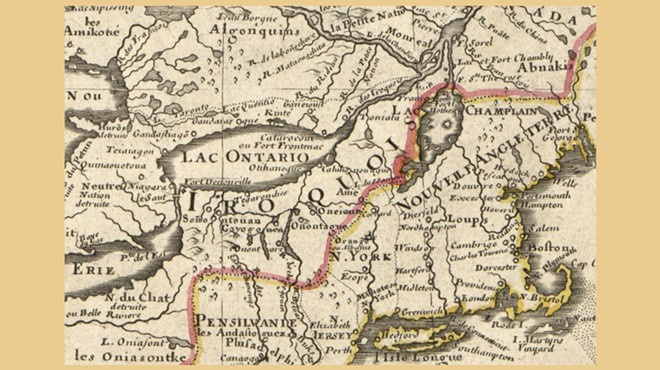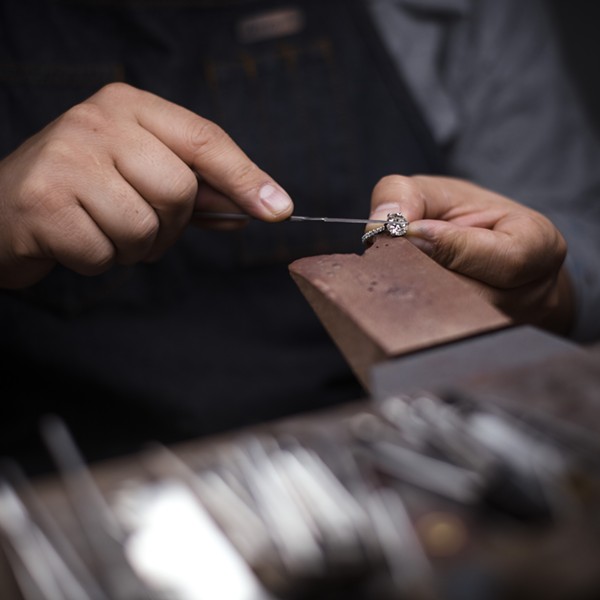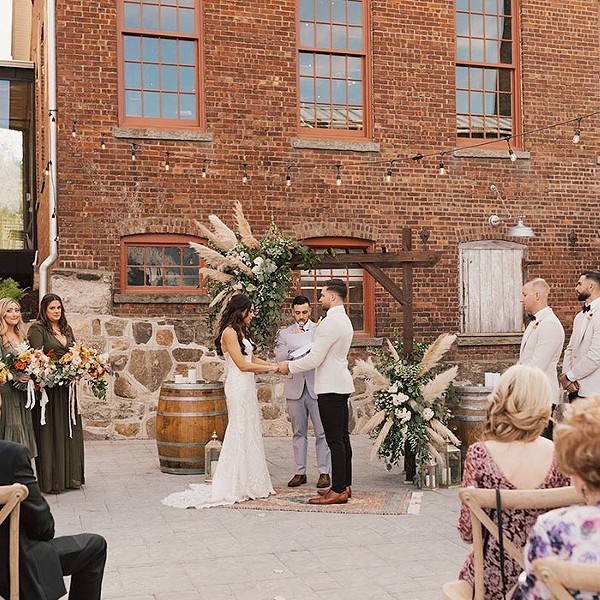
Setup: It's standard practice to begin setup for a wedding the night before. Keep in mind, though, that barns are often open to the elements overnight: Birds can fly in and out and ants and flies get into everything. Hlywiak recommends covering tables with plastic sheets so that nothing gets ruined overnight. "Dust kicks up on the floor, birds could poop on your tables; if you get plastic, it's a small investment and assures you that your tables won't be destroyed when you arrive the next day." Then there are small things like making sure lose nails aren't on the floor—you don't want a toddler to find that out while they're wandering around. Marybeth Boruta, the manager and wedding coordinator at Apple Barn Farm, says she goes as far as making sure every single light bulb is working in the barn—this way, when you get to dinner, you can rest assured all your guests will be able to see the people sitting across the table from them.
Also remember that not everything takes place indoors. You don't want your guests to arrive and have to weed whack their way through a field to find the barn. Have staff directing people to the proper location and pathways on the farm. If it rained the night before, guests might find themselves sinking into the grass—Boruta recommends putting gravel down and then throwing a drop cloth over it for easier traversing. And speaking of pathways, when it gets dark, make sure your guests can see where they're going. A fun way to do this is to set luminaries along pathways: to the bathroom, to the bonfire, to the parking area.
The Weather: Remember, barns weren't originally constructed for people. Because of this, more often than not, you won't have central air-conditioning, or heat if things get cold. In the summer, it can get very hot in a barn, so fans are important for circulating air. As soon as fall rolls around, don't think that you can get away with a few blankets. Heat lamps are nice in concept, but like Hlywiak says, "they only heat the immediate area, so you'll need to force heated air into the barn to keep people warm." Another consideration is having a plan B in case you can't have your outdoor ceremony due to rain. Always have a tent set up or have the barn staged for a ceremony, as well. Then again, rain isn't always bad news, says Giessinger: "Guests are warm and dry inside the barn while the rain pelts the roof; although you might not expect it, these are the makings of a truly memorable party."
Then there are the photos: A lot of the appeal of having a barn wedding is for those amazing photo ops on the property, but weather plays a big role in making those shots unforgettable. Sure, the rain could put a damper on them, but so could heat. Boruta goes the extra mile and shuts down Apple Barn Farm during the hottest part of the summer. Why would she turn away business at the height of wedding season? "In a drought I can't keep the grass green enough. And I promise green lawns," Boruta says. Those photos won't look quite as picturesque with dying, grayish grass.
Power, Bathrooms, and Cooking: When you're saying "I Do" in a banquet hall, it's understood that you'll have enough power to accommodate the band and the lighting, and plenty of bathrooms for a big guest list, plus a kitchen that can cook for your entire wedding. But out on the farm, things don't come as easily. Some barns do come with a built-in restroom, but one bathroom isn't enough for your guest list of 200. A general rule of thumb is that you should have one restroom per 35 guests. Turned off by the idea of a Porta Potty? (So are we.) Instead, consider renting the modern-day versions, which are beautiful, heated, restroom trailers that don't disrupt the elegance of your wedding design.
Then there's the power plan. Your barn might not even be wired! Knowing all your power needs is important, so be in constant contact with all your vendors about refrigeration and wattage requirements for equipment. Find out what the venue can account for and if you require a generator.
















